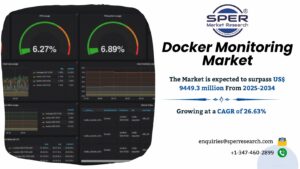USA Virtualization Security Market Size and Trends, Growth Drivers, Challenges, Business Strategy and Future Opportunities 2033: SPER Market Research

The protection against internet assaults on virtualized environments, including virtual machines, hypervisors, and other virtual infrastructures, is referred to as virtualization security. Virtual environment security is crucial given the increasing use of virtualization by businesses for scalability, resource efficiency, and cost savings. Important elements of virtualization security include limiting access control, ensuring secure communication across virtual networks, safeguarding the hypervisor, and isolating virtual machines to prevent cross-VM attacks. Traditional security methods are no longer sufficient since virtualization introduces extra attack surfaces. To control these threats and guarantee data availability, integrity, and confidentiality in virtualized environments, specialized solutions are employed, such as virtual firewalls, encryption, and intrusion detection systems.
According to SPER Market Research, ‘United States Virtualization Security Market Size – By Virtualization Type, By Component, By Type of Virtual Infrastructure, By End User – Regional Outlook, Competitive Strategies and Segment Forecast to 2033’ states that the United States Virtualization Security Market is estimated to reach USD XX billion by 2033 with a CAGR of 14.65%.
Drivers: The virtualization security market in the US has several promising opportunities. The increasing use of cloud computing, hybrid cloud, and virtualized infrastructures has led to a growing need for advanced security solutions to protect these configurations. The rise in cybersecurity threats, which mostly target virtual machines and hypervisors, has resulted in a rising need for specialized security solutions like virtual firewalls and intrusion detection systems. Virtualized security will have new potential as 5G and IoT technologies spread and more devices and networks need to be safeguarded. Additionally, advancements in AI and machine learning for threat detection enhance overall security management by offering possibilities for enhanced security automation and real-time reaction capabilities in virtual environments.
Request For Free Sample Report @ https://www.sperresearch.com/report-store/united-states-virtualization-security-market.aspx?sample=1
Restraints: The American virtualization security industry is confronted with several challenges. Modern virtualization security solutions are expensive to install, especially for small and medium-sized businesses, which prevents their widespread adoption. The difficulty of protecting and managing dynamic virtual environments presents various challenges for IT teams, especially in multi-cloud and hybrid setups. Incompatibilities between modern security solutions and antiquated systems may also make installation less effective. The absence of trained staff with both virtualization and cybersecurity knowledge exacerbates operational difficulties. Furthermore, market progress may be hampered by a reluctance to adopt comprehensive security solutions because of concerns about how security measures may impact the performance of virtualized systems.
The COVID-19 pandemic increased the adoption of cloud computing and remote work and had a significant impact on the US virtualization security market. As businesses shifted to remote operations, the need for safe virtual environments increased, exposing flaws in the security protocols in place. This move resulted in an increase in investment in virtualization security solutions to protect sensitive data and ensure business continuity. The rise in cyberattacks during the pandemic underscored the need for robust security measures in virtualized environments. Despite its challenges, the pandemic ultimately encouraged industry innovation and flexibility as companies prioritized cybersecurity to safeguard their virtual infrastructures from constantly evolving threats.
Key Players:
The Northeast region dominates the United States virtualization security market due to its concentration of financial institutions, large enterprises, and government agencies that require advanced cybersecurity solutions for their extensive virtualized environments. Major players in the market are VMware Inc, Trend Micro Incorporated, Sophos Ltd, Hytrust Inc, Juniper Networks Inc, 10ZiG Technology, Others.
US Virtualization Security Market Segmentation:
By Virtualization Type: Based on the Virtualization Type, United States Virtualization Security Market is segmented as; Hardware Virtualization, Software Virtualization.
By Component: Based on the Component, United States Virtualization Security Market is segmented as; Solutions, Services.
By Type of Virtual Infrastructure: Based on the type of Virtual Infrastructure, United States Virtualization Security Market is segmented as; Hypervisor, Virtual Machines, Web Servers, Other Virtual Infrastructures.
By End User: Based on the End User, United States Virtualization Security Market is segmented as; IT and Telecom, Cloud Service Providers, Data Centers, BFSI, Healthcare, Government, Other End-Users.
By Region: This research also includes data for Northeast, Midwest, South, West region of United States.
This study also encompasses various drivers and restraining factors of this market for the forecast period. Various growth opportunities are also discussed in the report.
For More Information, refer to below link: -
US Virtualization Security Market Size
Related Reports:
Follow Us –
LinkedIn | Instagram | Facebook | Twitter
Contact Us:
Sara Lopes, Business Consultant – USA
+1-347-460-2899








